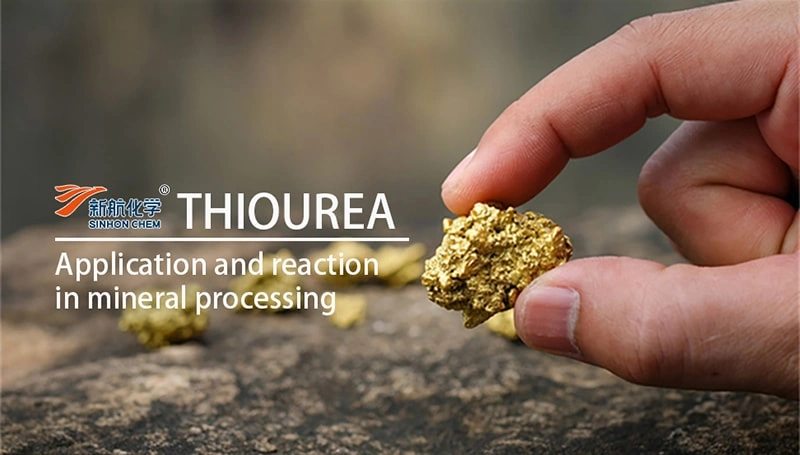03-Mar-2025

Thiourea (chemical formula CS(NH₂)₂) is mainly used in beneficiation as a flotation inhibitor, leaching agent or metal complexing agent, and its action depends on its unique chemical properties (coordination capacity of sulfur and amino groups). Sinhon Chem is the leading thiourea production plant in China, with an annual output of 20,000 tons, and its products are widely used in large mines in China, Russia, Uzbekistan, Africa and South America. The following are the specific applications and reaction principles of thiourea:
1. Application of thiourea in mineral processing
1.1. As a flotation inhibitor
Application scenario: In the flotation of sulfide ores (such as chalcopyrite, pyrite, galena, etc.), thiourea can selectively inhibit the flotation of certain minerals.
Mechanism of action:
Thiourea forms a stable complex with metal ions (such as Fe²⁺, Cu²⁺) by adsorbing on the surface of minerals, masking the active sites on the surface of minerals and reducing their hydrophobicity.
For example, in pyrite flotation, thiourea inhibits its adsorption with xanthate collectors, thereby reducing pyrite floating.
1.2. As a precious metal leaching agent
Application scenario: used for wet leaching of precious metals such as gold and silver (replacing cyanide).
Mechanism of action:
Under acidic conditions (PH < 3), thiourea synergizes with oxidants (e.g., Fe³⁺, H₂O₂) to oxidize gold to Au⁺ and form soluble thiourea-gold complexes:
Au + CS(NH₂)₂ + Fe³⁺ → Au(CS(NH₂)₂)⁺ + Fe²⁺
The reaction speed of this method is fast and the toxicity is low, but the oxidation conditions and thiourea concentration need to be strictly controlled.
1.3. As a masking agent for metal ions
In complex mineral separation, thiourea can form stable complexes with interfering metal ions (e.g., Cu²⁺, Hg²⁺), reducing its interference to the flotation or leaching process.
2. The reaction principle of thiourea
2.1. Complexing
The sulfur atom and amino group of thiourea donate lone pairs of electrons to form stable quaternary or six-membered ring complexes with metal ions (e.g., Au⁺, Ag⁺, Cu²⁺), such as:
Au⁺ + 2CS(NH₂)₂ → Au(CS(NH₂)₂)₂⁺
The stability of the complex depends on the metal species and the pH of the solution.
2.2. Redox reactions
In precious metal leaching, thiourea acts both as a ligand and also in redox reactions:
CS(NH₂)₂ + H₂O₂ → NH₂CSSCNH₂ + 2H₂O
(thiourea is oxidized)
The oxidation of dithiformamidine (NH₂CSSCNH₂) further promotes metal dissolution.
2.3. Surface adsorption and inhibition
In flotation, thiourea coats the surface of the mineral by physical adsorption or chemical bonding, which hinders the adsorption of collectors (such as xanthate) and reduces the hydrophobicity of the mineral.
3. Advantages and disadvantages of thiourea
Merit:
Low toxicity (compared to cyanide), better environmental protection;
Fast reaction speed, suitable for difficult minerals (e.g. carbonaceous gold ore);
High selectivity for precise inhibition of specific minerals.
Shortcoming:
The cost is high, and it is easy to oxidize and decompose (pH and oxidant need to be strictly controlled);
By-products (e.g., sulfides) may form at high concentrations or alkaline conditions, affecting efficiency.
4. Application examples
Gold ore leaching: thiourea-sulfuric acid-hydrogen peroxide system is used for the leaching of fine-grained gold ore, and the recovery rate can reach more than 90%.
Copper-molybdenum separation: In the flotation of copper-molybdenum mixed concentrate, thiourea inhibits chalcopyrite and promotes the selective uplift of molybdenite.
Thiourea has unique advantages in flotation inhibition, precious metal leaching and other fields due to its complexing ability, low toxicity and selectivity, but its application needs to optimize process conditions (such as pH, oxidant concentration, etc.) in combination with mineral characteristics. Future research directions for Sinhon's thiourea may include the development of thiourea stabilizers or compounds to improve efficiency.
Excellent service, reliable quality, delivering more value.
Contact us to start our journey of cooperation.
Email: [email protected]